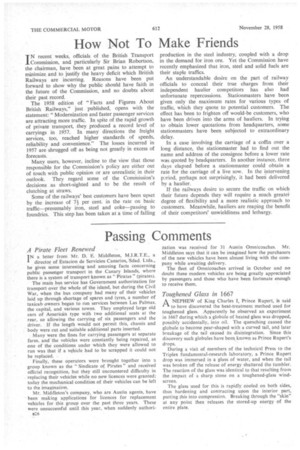How Not To Make Friends
Page 32

If you've noticed an error in this article please click here to report it so we can fix it.
IN recent weeks, officials of the British Transport Commission, and particularly Sir Brian Robertson, the chairman, have been at great pains to attempt to minimize and to justify the heavy deficit which British Railways are incurring. Reasons have been put forward to show why the public should have faith in the future of the Commission, and no doubts about their past record.
The 1958 edition of "Facts and Figures About British Railways," just published, opens with the statement: "Modernization and faster passenger services are attracting more traffic. In spite of the rapid growth of private transport, they produced a record level of carryings in 1957. In many directions the freight services, too, reached higher standards of speeds, reliability and convenience." The losses incurred in 1957 are shrugged off as being not greatly in excess of forecasts.
Many users, however, incline to the view that those responsible for the Commission's policy are either out of touch with public opinion or are unrealistic in their outlook. They regard some of the Commission's decisions as short-sighted and to be the result of clutching at straws.
Some of the railways' best customers have been upset by the increase of 71 per cent. in the rate on basic traffic—presumably iron, steel and coke—passing to foundries. This step has been taken at a time of falling production in the steel industry, coupled with a drop in the demand for iron ore. Yet the Commission have recently emphasized that iron, steel and solid fuels are their staple traffics.
An understandable desire on the part of railway officials to conceal their true charges from their independent haulier competitors has also had unfortunate repercussions. Stationmasters have been given only the maximum rates for various types of traffic, which they quote to potential customers. The effect has been to frighten off would-be customers, who have been driven into the arms of hauliers. In trying to obtain lower quotations from headquarters, some stationmasters have been subjected to extraordinary delay.
In a case involving the carriage of a coffin over a long distance, the stationmaster had to find out the name and address of the consignee before a lower rate was quoted by headquarters. In another instance, three days elapsed before a stationmaster could obtain a rate for the carriage of a live sow. In the intervening Nriod, perhaps not surprisingly, it had been delivered by a haulier.
If the railways desire to secure the traffic on which their future depends they will require a much greater degree of flexibility and a more realistic approach to customers. Meanwhile, hauliers are reaping the benefit of their competitors' unwieldiness and lethargy.












































































































